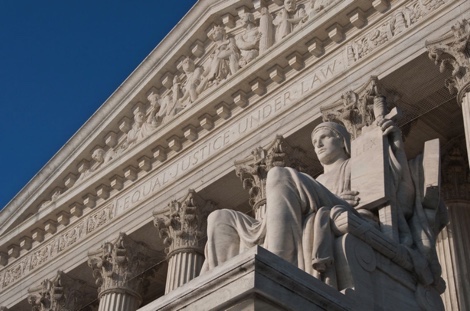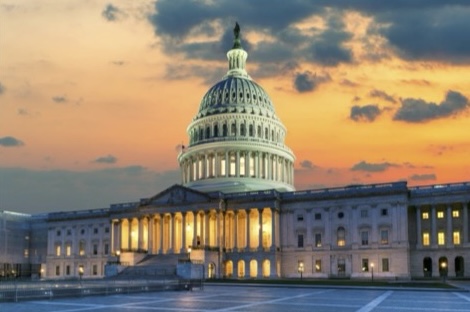Battleground: Views on the Supreme Court
This Navigator Research report contains polling data on battleground constituents’ attitudes toward the Supreme Court, including perceptions of the Court’s ideological tilt, the level of confidence constituents have to issue rulings according to the Constitution and not their political opinions, reactions to recent Court decisions, and whether Congress should investigate potential ethics violations by Supreme Court Justices.
Battleground constituents are evenly divided in their opinion of the Supreme Court.
47 percent of battleground constituents view the Supreme Court favorably and 49 percent view it unfavorably. This division largely falls along party lines, with significant majorities of Democrats (15 percent favorable – 87 percent unfavorable) and self-identified liberals (12 percent favorable – 87 percent unfavorable) holding deeply unfavorable views. Additionally, the Court’s favorability is underwater by double-digits with white college-educated constituents (net -20; 39 percent favorable – 59 percent unfavorable), women (net -13; 41 percent favorable – 54 percent unfavorable), and Black constituents (net -14; 39 percent favorable – 53 percent unfavorable). The Supreme Court is looked upon most favorably by conservative constituents (82 percent favorable – 13 percent unfavorable) and Republicans (80 percent favorable –16 percent unfavorable), those aged 55 and older (net +4; 51 percent favorable – 47 percent unfavorable), and men (net +12; 55 percent favorable – 43 percent unfavorable).
- Battleground constituents expressing a “very unfavorable” stance towards the Court outnumber those who are “very favorable” by 10 points (30 percent very unfavorable – 20 percent somewhat unfavorable).
- By a 29-point margin, battleground constituents say the Supreme Court is “too conservative” (15 percent too liberal – 34 percent just about right – 44 percent too conservative), including a plurality of independents who say it is too conservative (45 percent). This sentiment was also heavily reflected in our focus group report released yesterday on perceptions of the Court among independents in Nevada, younger and progressive constituents in Virginia, and Republicans and Republican-leaners in Minnesota.
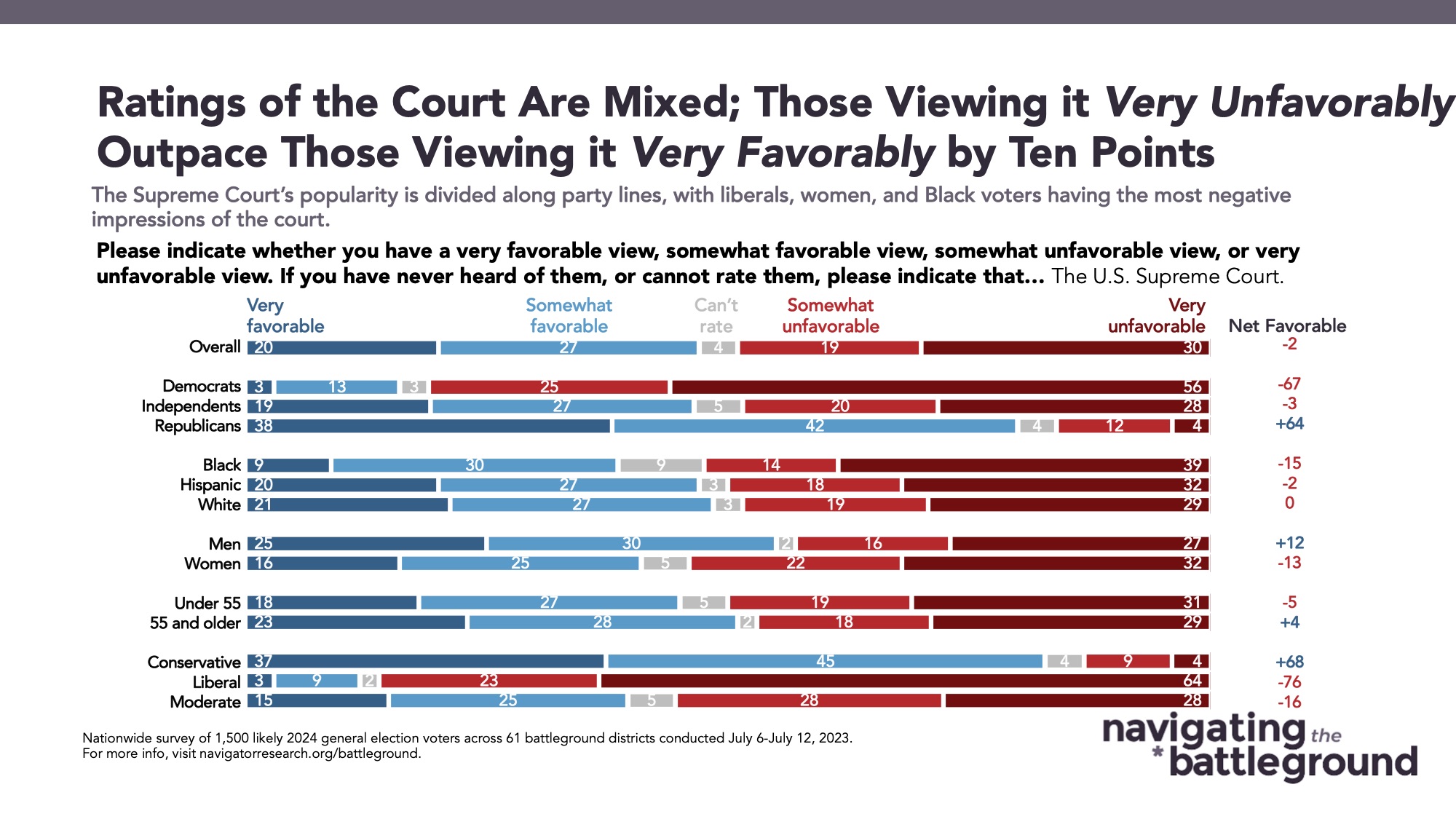
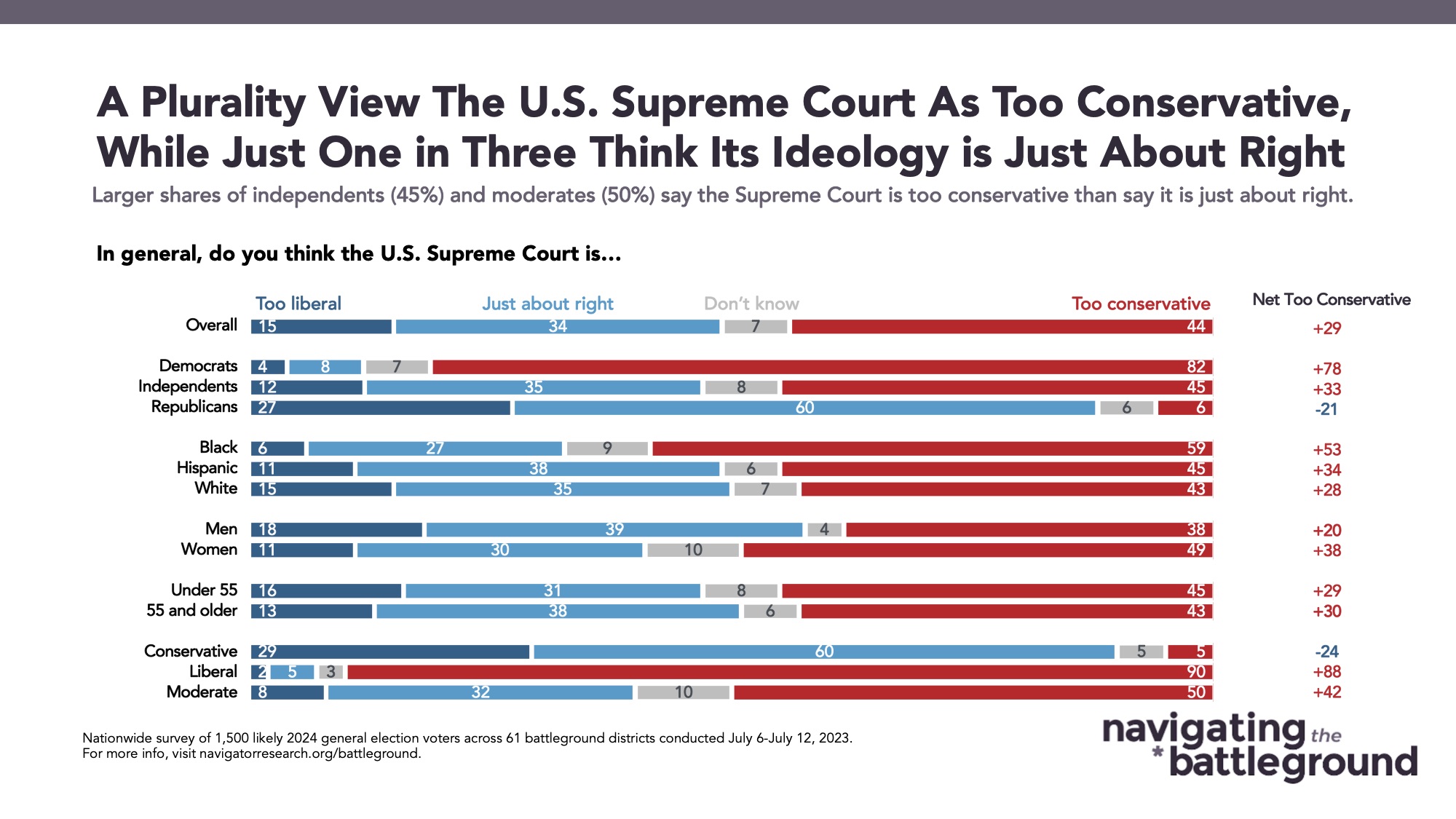
Among the recent decisions made by the Supreme Court, the decision to overturn Roe v. Wade is by far the most unpopular.
51 percent of battleground constituents strongly oppose the overturning of Roe, leading to a net 19-point disapproval overall (39 percent approve – 58 percent disapprove). The decision to overturn Roe v. Wade also faces the strongest disapproval from independents, who oppose it by a 23-point margin (36 percent support – 59 percent oppose), with strong opposition at 51 percent. Majorities of battleground constituents are also opposed to the decision that allows businesses to refuse service to LGBTQ+ people (net -14; 40 percent approve – 54 percent disapprove) and the ruling that determined gun restrictions to be illegal, potentially allowing more guns in public places (net -10; 43 percent approve – 53 percent disapprove).
- The Supreme Court’s decision to block the Biden administration’s proposal to forgive student loan debt for 43 million borrowers is narrowly supported by a 6-point margin (51 percent support – 45 percent oppose). Furthermore, the decision to make it illegal for colleges to consider race as one of many factors in deciding which students to admit is supported by 19 points (57 percent support – 38 percent oppose).
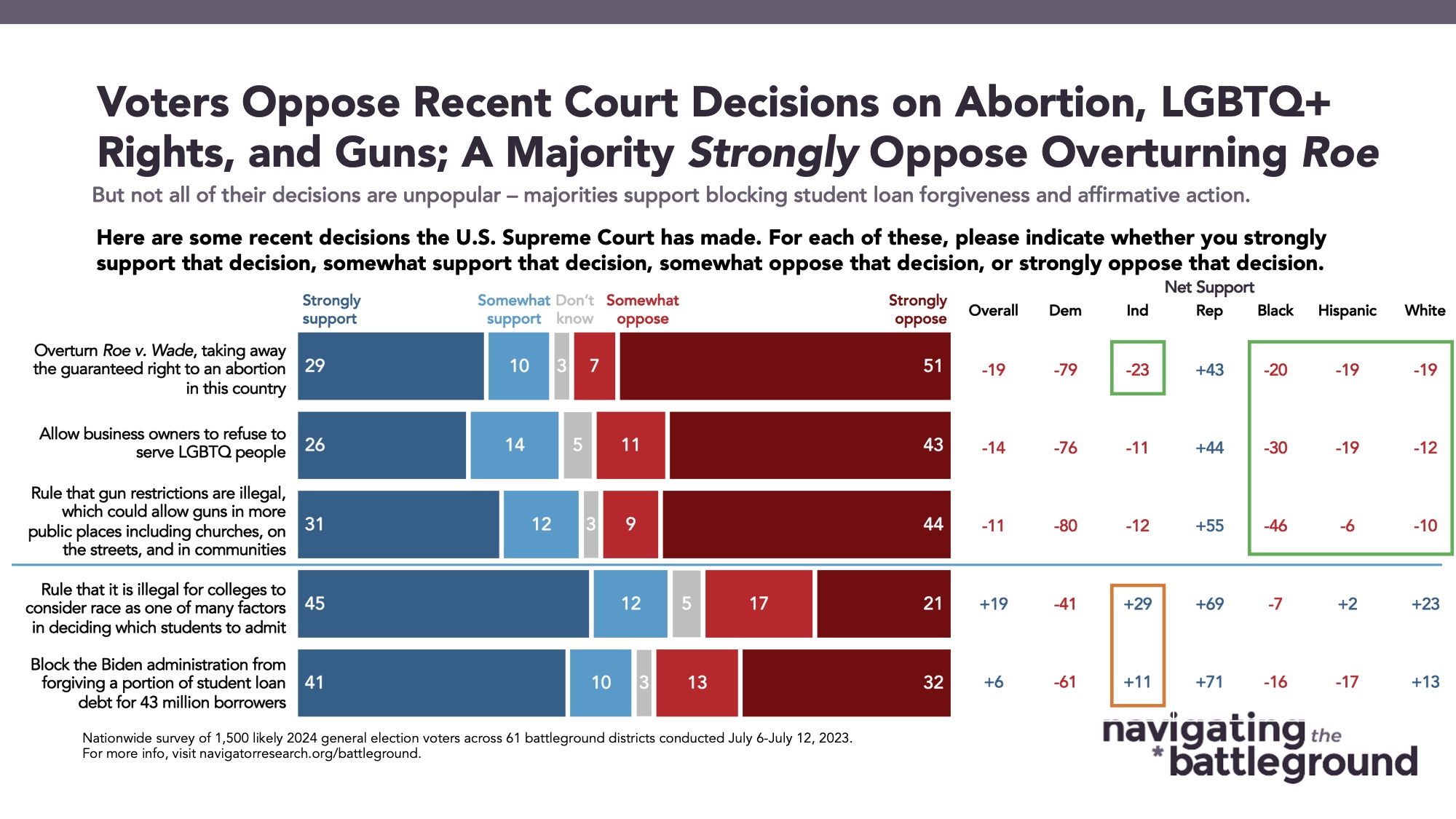
A plurality of battleground constituents think the Supreme Court is too conservative
Battleground constituents’ views on the ideological leanings of the Supreme Court show there is a significant lack of confidence in the Supreme Court’s ability to issue rulings independent of their own political biases. By a 12-point margin, constituents express little to no confidence in the Supreme Court to issue rulings according to the Constitution and not their own political opinions (43 percent confident – 55 percent not confident). The only groups exhibiting confidence in the Supreme Court to make non-partisan rulings by partisanship or ideology are Republicans (75 percent confident) and conservatives (74 percent confident, including 89 percent of those who are “very conservative).
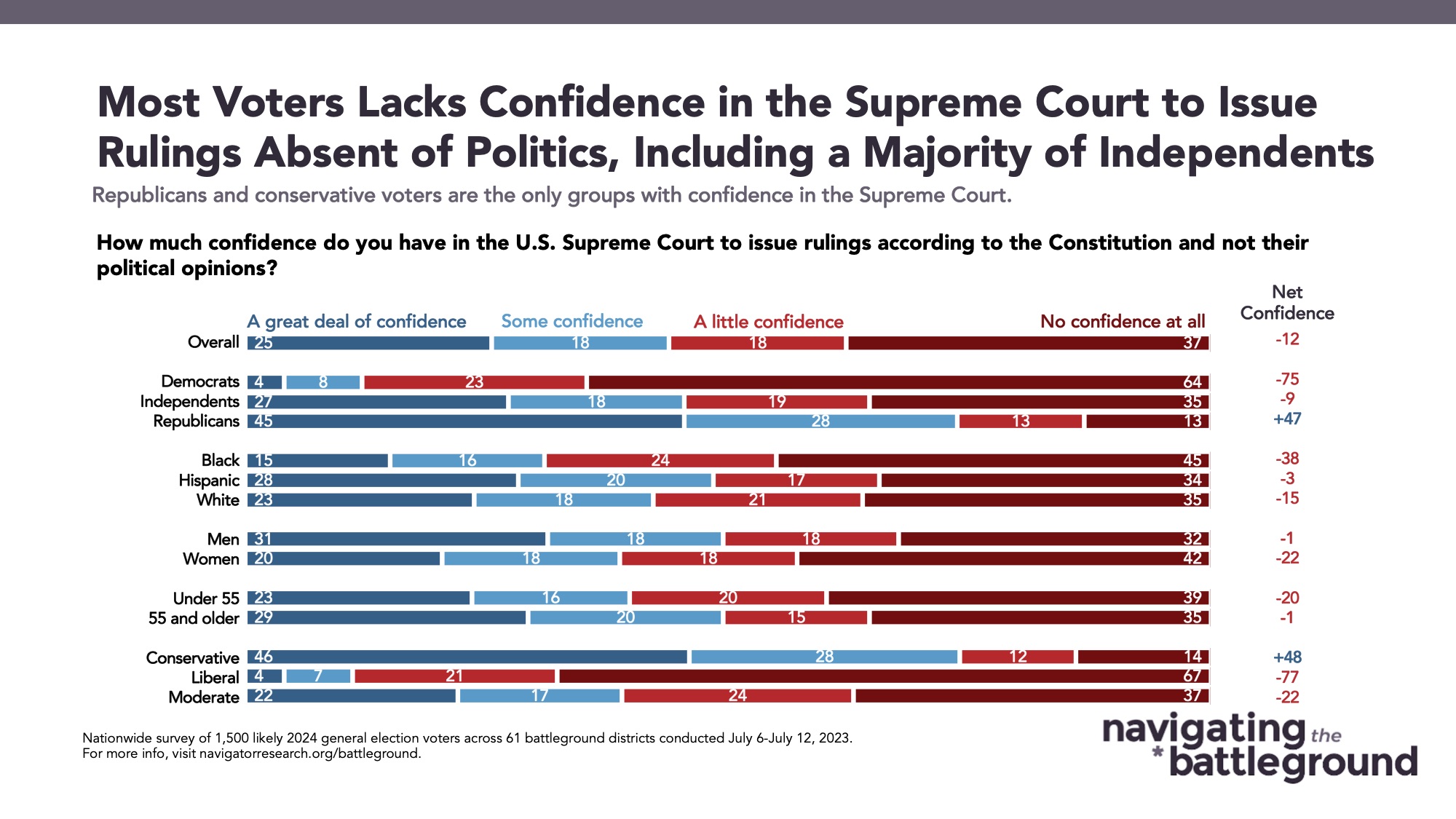
By an overwhelming 42-point margin, constituents support the investigation of Supreme Court Justices for corruption.
A majority of battleground constituents strongly favor Congress launching an investigation into the U.S. Supreme Court justices for corruption when given the context that “multiple U.S. Supreme Court justices have accepted gifts and lavish vacations from billionaires who later had cases that were heard by the Supreme Court that directly impacted them and their businesses… the justices did not disclose the gifts and trips and did not remove themselves from hearing the cases involving the billionaires” (68 percent, including 53 percent who are strongly supportive; only 26 percent oppose investigations). This includes 90 percent of Democrats, two in three independents (66 percent), and even a narrow plurality of Republicans (47 percent favor – 43 percent oppose). This is consistent with recent findings from our national survey released earlier this week where support was even higher (net +50; 67 percent support – 17 percent oppose).
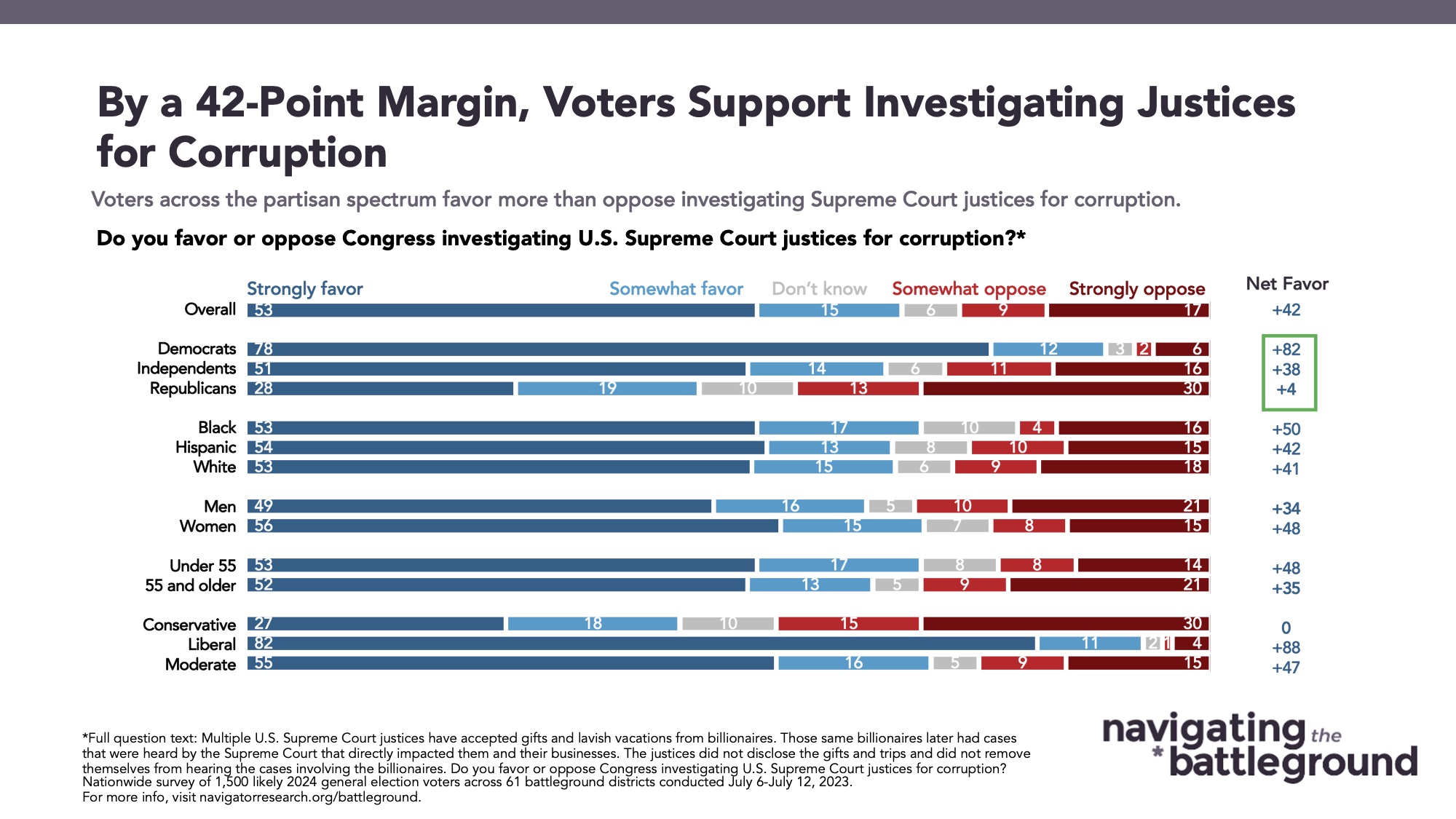
About The Study
Impact Research conducted public opinion surveys among a sample of 1,500 likely 2024 general election voters from July 6-July 12, 2023. The survey was conducted by a mix of text-to-web (74 percent) and an opt-in, online panel (26 percent). Respondents were verified against a voter file and special care was taken to ensure the demographic composition of our sample matched that of the 61 congressional districts included in the sample across a variety of demographic variables. The margin of error for the full sample at the 95 percent level of
confidence is +/- 2.5 percentage points. The margin for error for subgroups varies and is higher.
